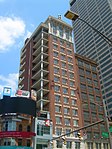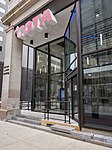16 East Broad Street
Buildings in downtown Columbus, OhioChicago school architecture in OhioColumbus, Ohio building and structure stubsNational Register of Historic Places in Columbus, OhioOffice buildings completed in 1900 ... and 1 more
Skyscraper office buildings in Columbus, Ohio

16 East Broad Street is a building on Capitol Square in Downtown Columbus, Ohio. Completed in 1901, the building stands at a height of 168 feet (51 m), with 13 floors. It stood as the tallest building in the city until being surpassed by 8 East Broad Street in 1906.From 1927 to 1939, the eleventh floor of the building served as the office for the National Football League. Joseph F. Carr, a Columbus native, was president of the NFL at the time.
Excerpt from the Wikipedia article 16 East Broad Street (License: CC BY-SA 3.0, Authors, Images).16 East Broad Street
East Broad Street, Columbus
Geographical coordinates (GPS) Address External links Nearby Places Show on map
Geographical coordinates (GPS)
| Latitude | Longitude |
|---|---|
| N 39.9625 ° | E -83.0002 ° |
Address
New Hayden Building
East Broad Street 12
43215 Columbus
Ohio, United States
Open on Google Maps










